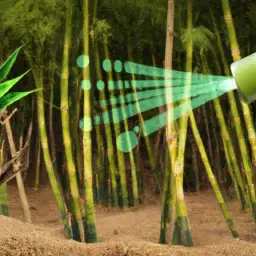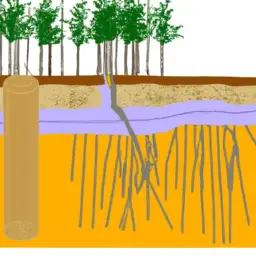As someone who cares deeply about the environment, I am thrilled to share with you the incredible ways bamboo products are safeguarding our precious forests.
From sustainable sourcing practices to reduced deforestation, bamboo offers a compelling alternative to virgin wood products.
Not only does it sequester carbon and preserve biodiversity, but it also conserves water and prevents soil erosion.
With decreased pesticide use and a focus on community empowerment and fair trade, bamboo truly stands as a powerful ally in protecting our forests.
Sustainable Sourcing Practices

I’ve found that sustainable sourcing practices are crucial for protecting our forests when it comes to bamboo products. As a consumer, I believe it’s important to choose products that aren’t only beautiful and functional but also produced in an ethical and eco-friendly manner.
When it comes to bamboo, sustainable sourcing means ensuring that the bamboo used in the production of various products is grown and harvested responsibly. This involves practices that prioritize the long-term health and regeneration of bamboo forests, as well as the livelihoods of the communities that depend on them.
Ethical manufacturing is an integral part of sustainable sourcing practices. It involves ensuring fair labor conditions for workers involved in the production process. This means paying fair wages, providing safe working environments, and respecting workers’ rights. By supporting companies that prioritize ethical manufacturing, we can contribute to the well-being of individuals and communities involved in the production of bamboo products.
In addition to ethical manufacturing, eco-friendly production is another key aspect of sustainable sourcing practices. Bamboo is known for its rapid growth and low environmental impact. It requires minimal water and no pesticides or fertilizers to thrive. By choosing bamboo products, we can reduce our carbon footprint and support a more sustainable future.
Reduced Deforestation

Reduced deforestation is a significant benefit of using bamboo products. Bamboo is a renewable resource that grows quickly, making it an excellent alternative to traditional timber. By using bamboo instead of wood, we can help protect our forests from being cut down for construction and other purposes. This not only preserves the beauty and biodiversity of our forests but also reduces emissions and helps combat climate change.
One of the main reasons bamboo products contribute to reduced deforestation is their rapid growth rate. Unlike trees, which can take decades to reach maturity, bamboo can be harvested within a few years. This means that bamboo can be used as a sustainable and renewable resource, providing a viable alternative to wood products that require the cutting down of trees.
Additionally, the use of bamboo products reduces emissions compared to traditional timber. When trees are cut down, they release carbon dioxide into the atmosphere. By using bamboo instead, we can help mitigate this release of greenhouse gases. Furthermore, bamboo is known for its ability to absorb large amounts of carbon dioxide from the air, making it even more environmentally friendly.
Alternative to Virgin Wood Products

Using bamboo products as an alternative to virgin wood products offers a sustainable solution for reducing deforestation. Not only does it help in preserving our forests, but it also contributes to reduced waste and eco-friendly manufacturing practices.
When bamboo is harvested, it can be regrown within a few years, unlike traditional wood species that take decades to mature. This rapid growth makes bamboo a highly renewable resource, allowing us to meet our needs without depleting forests. By using bamboo products instead of virgin wood products, we can significantly reduce the demand for logging and the destruction of natural habitats.
Additionally, the manufacturing process of bamboo products produces significantly less waste compared to traditional wood processing. Bamboo can be processed into various products, such as furniture, flooring, and paper, using eco-friendly techniques that minimize environmental impact. These techniques often involve using natural adhesives and finishes, further reducing the release of harmful chemicals into the environment.
Furthermore, bamboo has a higher tensile strength compared to wood, making it a durable and long-lasting alternative. This means that bamboo products have a longer lifespan, reducing the need for frequent replacements and ultimately reducing waste.
Carbon Sequestration Benefits

There are several ways in which bamboo products contribute to the sequestration of carbon dioxide. Bamboo is known for its rapid growth and high carbon absorption capacity. As it grows, bamboo takes in carbon dioxide from the atmosphere and stores it in its stalks. This process helps to reduce the amount of greenhouse gases in the air and mitigates climate change.
The economic impact of bamboo products also plays a role in carbon sequestration. Bamboo is a versatile and sustainable resource that can be used in various industries, such as construction, furniture, and paper production. By promoting the use of bamboo products, we can reduce the demand for traditional materials, such as wood and plastic, which have a higher carbon footprint.
Furthermore, the cultivation of bamboo for commercial purposes can lead to the restoration of degraded lands. Bamboo plantations help to improve soil quality, prevent erosion, and promote biodiversity. These benefits contribute to climate change mitigation by creating a healthier environment for carbon sequestration.
Preservation of Biodiversity

Both the cultivation and use of bamboo products contribute to the preservation of biodiversity by supporting a wide range of plant and animal species. Bamboo forests provide habitat for a diverse array of wildlife, including various bird species, mammals, and insects. These forests serve as a sanctuary for endangered animals, such as the giant panda, which heavily relies on bamboo for its survival. By promoting the growth of bamboo, we’re indirectly preserving the wildlife that depends on it.
Furthermore, bamboo cultivation also aids in habitat restoration. Due to its fast growth and extensive root system, bamboo can help stabilize soil and prevent erosion. This is crucial for maintaining the health of ecosystems and ensuring the survival of many plant and animal species. Moreover, bamboo forests act as natural water filters, purifying the water that flows through them and providing clean water sources for both wildlife and humans.
Water Conservation

My favorite aspect of bamboo products is their ability to contribute to water conservation by reducing the need for irrigation. Bamboo is a highly water-efficient plant, requiring significantly less water compared to other crops. This water efficiency is important because it helps to conserve our precious water resources.
In traditional agriculture, large amounts of water are used to irrigate crops. This excessive water usage puts a strain on our water supplies and can lead to water scarcity in many regions. However, bamboo is different. It has a unique ability to thrive in areas with limited water availability, making it an ideal choice for water conservation.
By using bamboo products, we can reduce the demand for water-intensive crops and contribute to overall resource conservation. Bamboo grows rapidly and can be harvested in just a few years, making it a sustainable and renewable resource. This means that we can continue to use bamboo products without depleting our water resources or harming the environment.
In addition to its water efficiency, bamboo also helps to prevent soil erosion, another important aspect of water conservation. The extensive root system of bamboo helps to stabilize the soil, reducing runoff and preventing the loss of valuable topsoil.
Decreased Pesticide Use

I’ve noticed that using bamboo products leads to decreased pesticide use in our forests, thanks to the natural pest-resistant properties of bamboo. Unlike other plants, bamboo contains a bio-agent called ‘bamboo kun’ that repels pests and insects, making it unnecessary to use harmful pesticides. This makes bamboo a perfect choice for organic farming and promotes the use of eco-friendly alternatives.
Organic farming aims to minimize the use of synthetic chemicals and encourages natural methods of pest control. Bamboo fits perfectly into this concept as it requires little to no pesticide application. Farmers can rely on bamboo’s inherent pest-resistant properties to protect their crops, reducing the need for chemical sprays that harm the environment and human health.
By choosing bamboo products, we contribute to the reduction of pesticide use in our forests. This means less contamination of soil, water, and air, which ultimately benefits both ecosystems and human populations. Additionally, decreased pesticide use helps preserve the natural balance of our forests, allowing beneficial insects and organisms to thrive.
Furthermore, bamboo’s ability to naturally repel pests encourages the exploration of eco-friendly alternatives to synthetic pesticides. This promotes research and development of sustainable pest control methods that are safe for the environment and human consumption.
Soil Erosion Prevention

To prevent soil erosion, bamboo products are being utilized more and more in various industries. Bamboo’s strong and flexible nature makes it an ideal material for erosion control measures. Not only does it provide effective protection against soil erosion, but it also has a minimal environmental impact compared to traditional methods.
Bamboo products such as erosion control mats and bamboo stakes are commonly used to stabilize slopes and prevent the loss of topsoil. These products create a physical barrier that holds the soil in place, allowing vegetation to take root and further strengthen the soil structure.
The use of bamboo in erosion control measures has several advantages. Firstly, bamboo is a fast-growing plant that can be harvested sustainably without causing significant damage to the environment. Secondly, bamboo has a high tensile strength, making it highly effective in preventing soil erosion even in areas with heavy rainfall or strong winds.
Community Empowerment and Fair Trade

One way bamboo products are promoting community empowerment is through fair trade practices. Fair trade ensures that the producers of bamboo products receive fair compensation for their work, helping to uplift their economic status and contribute to their overall development. By providing a fair and stable income, fair trade allows communities to invest in education, healthcare, and infrastructure, leading to long-term economic growth.
Furthermore, fair trade has a positive social impact on communities. It encourages the formation of cooperatives and empowers individuals to collectively negotiate better prices for their products. This strengthens social cohesion and fosters a sense of unity and solidarity among community members. Fair trade also promotes gender equality by ensuring that women are included in decision-making processes and have equal opportunities for economic empowerment.
The social impact of fair trade extends beyond the immediate community as well. By supporting fair trade practices, consumers can contribute to the well-being of bamboo-producing communities and help create a more equitable global trade system. When we choose bamboo products that adhere to fair trade principles, we’re making a conscious decision to support economic growth and social justice.
Conclusion
In conclusion, bamboo products play a crucial role in protecting our forests and promoting sustainability.
Through sustainable sourcing practices, reduced deforestation, and acting as an alternative to virgin wood products, bamboo helps preserve biodiversity and prevent soil erosion.
Additionally, bamboo products contribute to carbon sequestration, water conservation, decreased pesticide use, and empower communities through fair trade.
By choosing bamboo, we can make a positive impact on our environment and ensure the long-term health of our forests.

